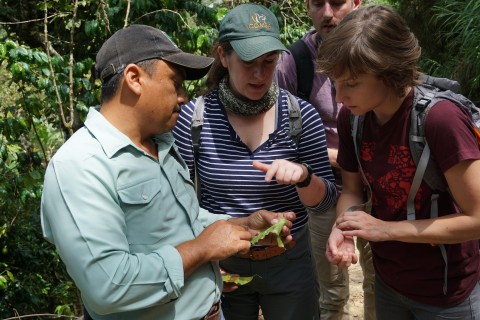
When I travel to visit our coffee producer partners, I often fly solo. Most recently, however, I co-led a group of Equal Exchange worker-owners on a trip to visit our coffee partners at CESMACH and Finca Triunfo Verde cooperatives in Chiapas, Mexico. The group represented worker-owners from all over Equal Exchange: West Coasters and East Coasters, folks from distribution, production, finance, operations, customer service, and our cafe in Boston.
We organize staff trips for a variety of reasons but two of the primary reasons for this particular trip were to bring a diverse group of worker-owners to an important partner of ours to experience and learn directly from the farmers and their cooperatives about the challenges, successes, and progress of our trade relationships, as well as some hands on barista and roasting training.
This was my first experience organizing two full days of training for our partner cooperatives in the areas of roasting and barista skills. Sarah Hrisak, our lead roaster, worked with four roasters from CESMACH and Finca Triunfo Verde (FTV) co-ops on the fundamentals of roasting and strategies for coffee quality standardization. Both CESMACH and FTV roast coffee and sell it nationally to restaurants, hotels, and cafés in Mexico as a secondary source of income for their cooperatives.
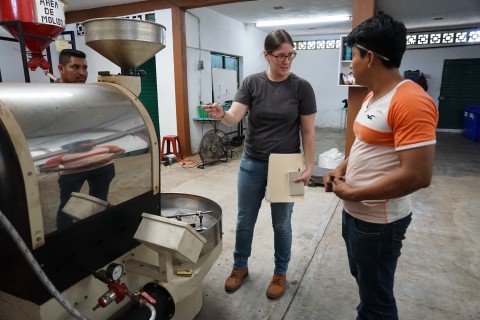
Equal Exchange Lead Coffee Roaster Sarah Hrisak during a skill sharing on roasting.
In an effort to strengthen their roasting operations, Sarah did a collaborative training with the roasting teams based on their areas of interest. The training covered a lot of ground, but two of the highlights for me were a discussion about roasting curves and creating a tool for the training of future roasters and our group production cupping where we compared roast levels between our roasting teams. It was really cool to see the roasters engage over a shared passion for good coffee. Sarah was able to really connect with the roasters over both the mechanics and art of roasting.
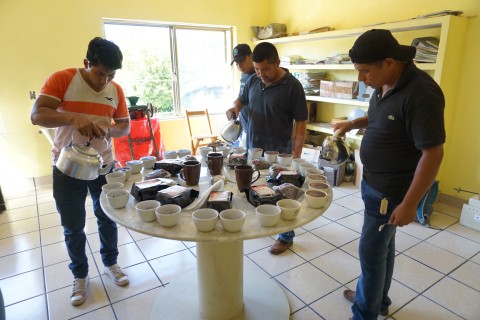
Members of the quality team at CESMACH cup samples of each roast level offered by Equal Exchange.
Later in the week, Andrew “Cheev” Cheever, a barista from our Boston cafe, led a training at the CESMACH café in the capital of the state of Chiapas, Tuxtla Gutierrez. Cheev has worked at the Equal Exchange Café in Boston for four years and tapped into that experience to share best practices with the three baristas at the CESMACH café. With me translating between Cheev and the café team, we covered the fundamentals of espresso, tools to improve milk steaming, and future goals for the CESMACH café. Cheev led a fun and highly-caffeinated training that focused heavily on collaboration and improving on the strengths the baristas have already developed.
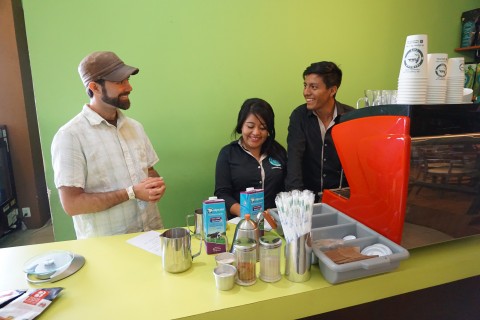
Andrew “Cheev” Cheever, a barista at the Equal Exchange Cafe in Boston, during a training at the CESMACH cafe in Tuxtla Gutierrez.
One of the most exciting aspects of these trainings is that the roasting and café operations for CESMACH and FTV represent income diversification. In addition to supplying buyers like Equal Exchange with high quality, organic, specialty coffee, these cooperatives are also developing markets locally and throughout Mexico to sell coffee that they have roasted, thus creating a value-added product that also generates local employment opportunities. This is meaningful and important because the cooperatives are creating a diversified business plan that does not solely rely on international buyers.
Over the past few years as a coffee buyer, I have struggled and debated (both internally and with peers across the industry) the impact that price increases and premiums can have on fundamentally impacting the efficacy of trade. Equal Exchange has been around for 30 years and while I think it is an achievement that we are still here, and independent, and continuing to develop our cooperative supply chains, I can also reflect back on what we have not been able to achieve. What else can we do to support our trade partners besides pay premiums for organic or certified production? Because that has not resulted in a true shift-change in the system or on the level of individual smallholders.
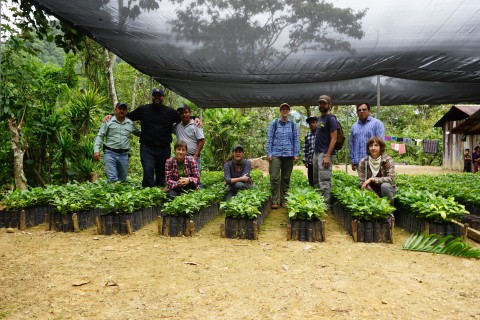
The Equal Exchange delegation in Chiapas, Mexico.
Ultimately, as a buyer I hope to collaborate directly with our partners to co-create a vision of success and economic prosperity for coffee farmers and then carry it out together. I still think this is a pretty pie-in-the-sky vision that has become even more elusive with the mounting pressures of climate change and the consolidation of the market on the consumer side. And yet, this recent experience in Chiapas of working together with CESMACH and FTV on roasting and barista training provided me with a glimpse of what we might be able to achieve in the future: diversified cooperatives that we support in a direct, commercial way as well as through sharing human resources and project work.
Ultimately, a true shift change in the economic conditions of smallholder farmers requires much more than social premiums and small, uncoordinated projects. I hope that through expanding our efforts as buyers, importers, and roasters we can directly collaborate with farmers, agronomists, co-op staff, roasters, and baristas at our partner organizations to create that shift change together.
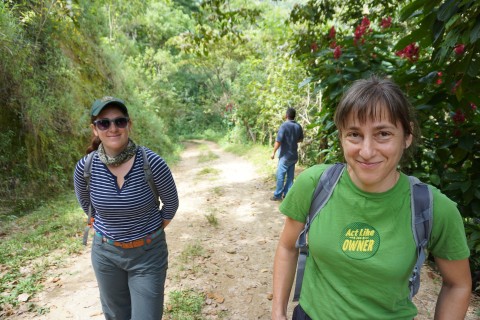
Carly Kadlec with Equal Exchange Co-Director of Operations Jessie Myszka.
